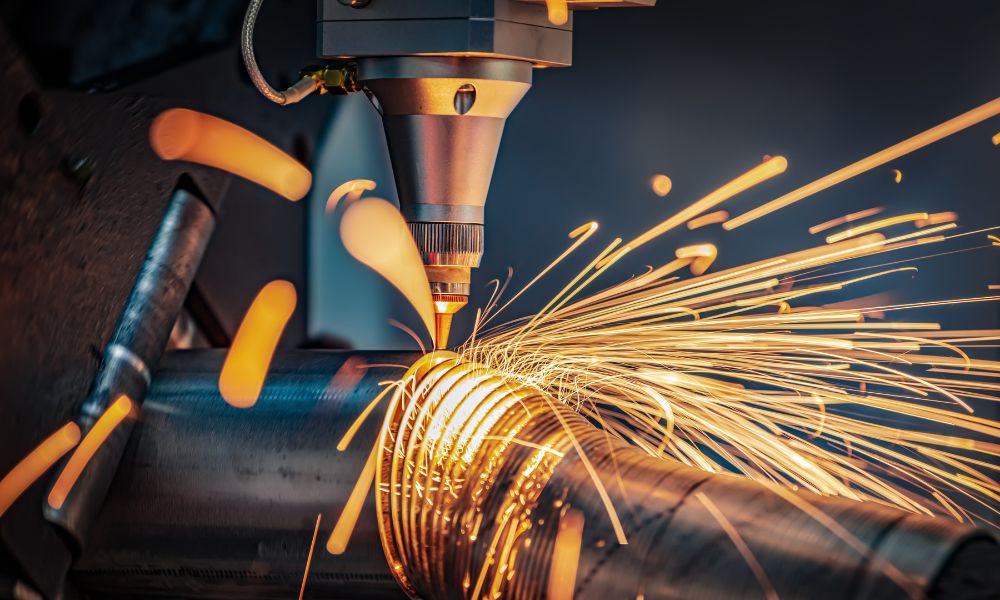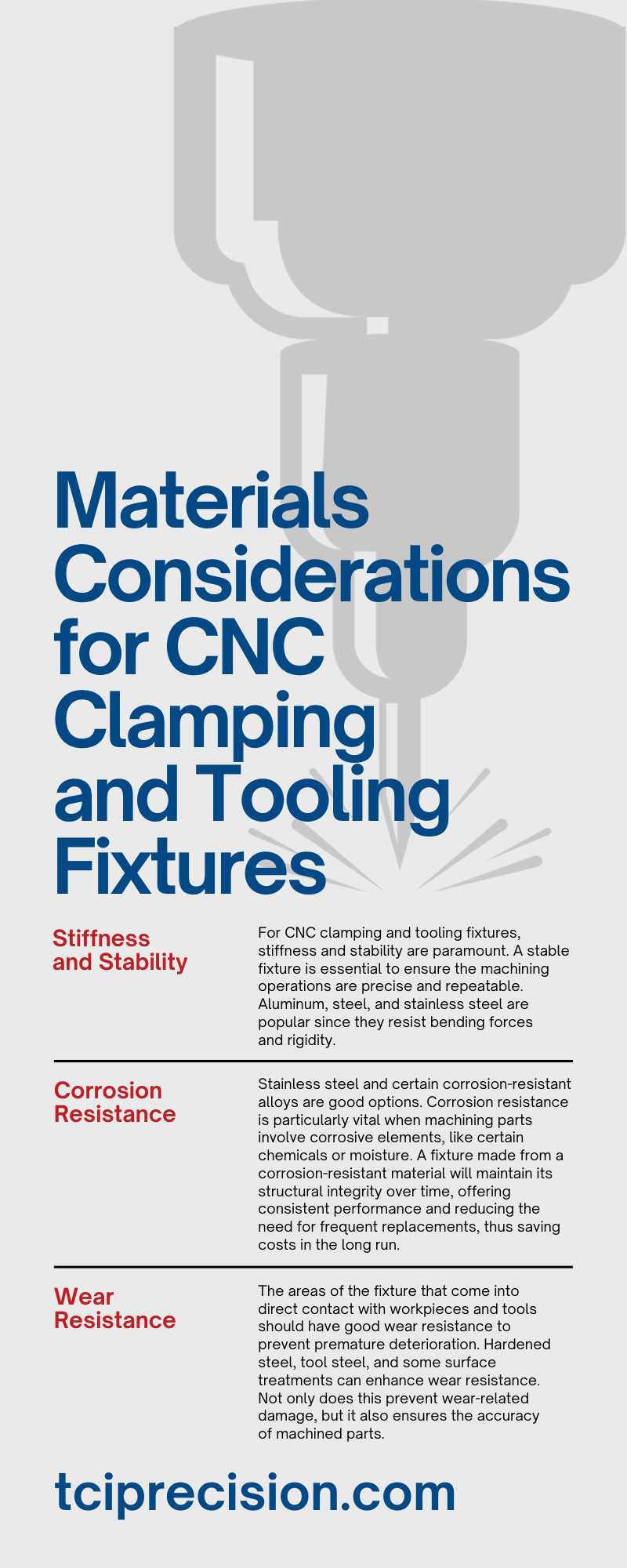Materials Considerations for CNC Clamping and Tooling Fixtures
When it comes to CNC clamping and tooling fixtures, choosing the right materials is essential. If you want to optimize your machining operations and increase performance while saving money in the long run, considering different materials for your setup could be an ideal solution.
These are some material considerations for CNC clamping and tooling fixtures to keep in mind.
Stiffness and Stability
For CNC clamping and tooling fixtures, stiffness and stability are paramount. A stable fixture is essential to ensure the machining operations are precise and repeatable. Aluminum, steel, and stainless steel are popular since they resist bending forces and rigidity.
Corrosion Resistance
Depending on the machining environment, you must choose materials that resist corrosion to ensure the longevity of the fixtures. Stainless steel and certain corrosion-resistant alloys are good options. Corrosion resistance is particularly vital when machining parts involve corrosive elements, like certain chemicals or moisture. A fixture made from a corrosion-resistant material will maintain its structural integrity over time, offering consistent performance and reducing the need for frequent replacements, thus saving costs in the long run.
Wear Resistance
The areas of the fixture that come into direct contact with workpieces and tools should have good wear resistance to prevent premature deterioration. Hardened steel, tool steel, and some surface treatments can enhance wear resistance. Not only does this prevent wear-related damage, but it also ensures the accuracy of machined parts.
Heat Resistance
Fixtures may be exposed to high temperatures generated during machining. Choose materials that can handle these temperatures without undergoing deformation or losing their mechanical properties.
For example, heat-resistant alloys are ideal for machining applications that involve higher temperatures. This difference makes them great for fixtures such as high-speed cutting and grinding.
Machinability
Consider the machinability of the chosen material. Some materials might be challenging to machine, increasing production costs and lead times. When you choose a material with good machinability, it enables faster and more accurate machining operations. This machinability also reduces the need for frequent tool changes.
Weight
The weight of the fixture affects handling, setup, and machining dynamics. While heavier materials like cast iron provide stability, lightweight materials like aluminum can be advantageous for faster setup and reduced operator fatigue.
Thermal Expansion
Different materials have varying coefficients of thermal expansion. Choose materials with similar coefficients to the workpiece material to minimize dimensional changes during machining.
Electrical Conductivity
Consider the electrical conductivity of materials for machining operations that involve electrical discharge machining (EDM). Some materials are better conductors than others, which makes them ideal for EDM operations. You should also be aware of the electrical properties of your workpiece material to ensure efficient EDM operations.
Common Materials Used for CNC Clamping and Tooling Fixtures
Let's look at some common material choices for CNC clamping and tooling fixtures.
Steel
Steel is the most common material for CNC clamping and tooling fixtures. It is known for its high strength, durability, and resistance to wear and tear. Steel fixtures can support heavy workpieces and endure high clamping forces without deformation, providing stable and precise machining. Furthermore, steel fixtures can maintain accuracy over time, ensuring consistent part quality. Steel can be expensive, but its reliability and longevity make it a cost-effective choice in the long run.
Aluminum
Aluminum is another popular material for CNC clamping and tooling fixtures. It is lightweight, making it easy to handle and move, which reduces setup time. Also, aluminum has excellent thermal conductivity, which can dissipate heat generated during machining, preventing workpiece distortion and fixture damage. However, aluminum is not as strong as steel, and clamping forces must be carefully controlled to avoid deformation. Nonetheless, aluminum fixtures are ideal for low to medium loads and are generally more affordable than steel fixtures.
Titanium
Titanium is a high-strength material commonly used in aerospace and medical industries for its corrosion resistance and biocompatibility. Titanium fixtures offer excellent vibration damping, reducing chatter and enhancing surface finish. They can also withstand high clamping forces without deformation, making them suitable for heavy-duty machining. However, titanium is expensive, and its hardness can cause premature tool wear, increasing machining costs.
Plastic
Plastics like nylon, Delrin, and PVC are used in CNC clamping and tooling fixtures for their low coefficient of friction, excellent chemical resistance, and non-marring properties, making them ideal for delicate or soft workpieces. The non-conductive properties of plastic fixtures make them useful in electrical and electronic applications, preventing electrical problems. Nonetheless, the durability of plastic fixtures is lower than metal fixtures, requiring frequent replacement due to wear and deformation.
Cast Iron
Cast iron can be used for CNC clamping and tooling fixtures due to its excellent wear resistance, high strength, good thermal conductivity, and low cost. Cast iron is also an excellent choice for heavy-duty operations and offers a more rigid setup than aluminum or steel. However, cast iron has poor machinability and can be susceptible to corrosion. It is also much heavier than aluminum or steel, making it difficult to move and handle.
Composite Materials
Composite materials like carbon fiber, fiberglass, and Kevlar have gained popularity in CNC clamping and tooling fixtures, especially in the aerospace and automotive industries. Composite fixtures are lightweight, strong, and durable, providing excellent stiffness and vibration damping that leads to high accuracy and surface quality. Additionally, composite fixtures can be designed to have a specific shape or pattern according to the part's geometry, providing customized solutions. However, composite fixtures are expensive and can be challenging to machine due to their anisotropic nature.
When selecting materials for CNC clamping and tooling fixtures, consider the requirements of your application and the properties of each material to make an informed decision. Furthermore, always remember safety protocols and environmental considerations when using machining tools. With these factors in mind, you can ensure successful results with quality parts that meet your project specifications.
Aside from choosing the right fixture materials, it is also important to consider the design of the fixtures. The fixture should provide even clamping force, easy accessibility, and reliable repeatability. It should also be designed according to the principles of ergonomics for operator comfort and safety. Proper design will make your machining operations more efficient, resulting in higher quality parts and increased production throughput.
If you need help with metal services, TCI Precision Metals can provide expert advice and assistance. TCI Precision Metals is here for all your metalworking needs, from choosing the right materials to precision sawing. Contact us today; we can help you create the perfect project!


